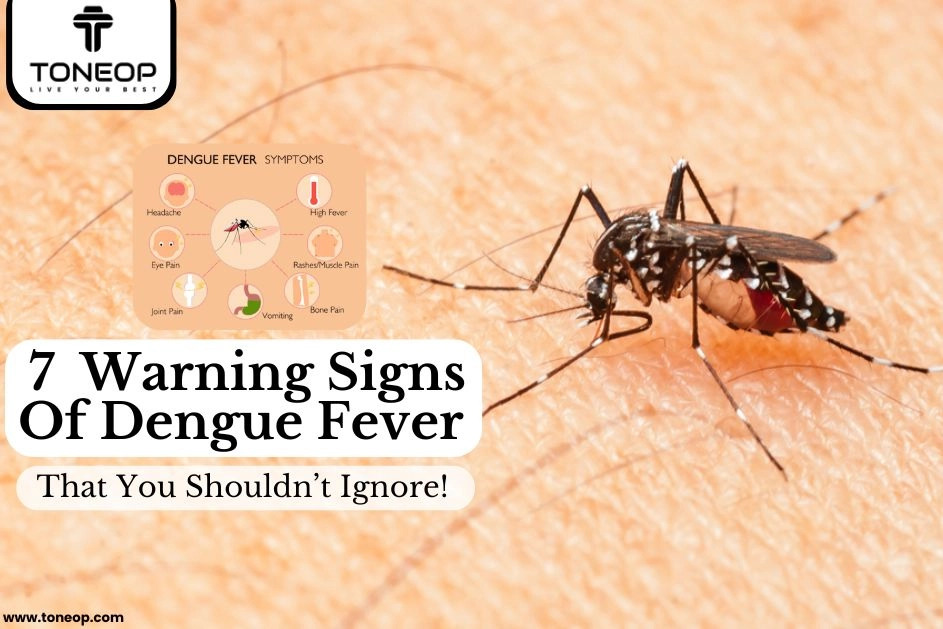As the rain brings a welcome break from the intense summer heat, it also creates ideal conditions for the Aedes aegypti and Aedes albopictus mosquitoes. These mosquitoes thrive in stagnant water and can transmit dengue fever, a viral infection that can become quite serious. Dengue fever is caused by one of four related dengue virus serotypes (DENV-1, DENV-2, DENV-3, and DENV-4), each capable of causing severe illness. According to data from the National Centre for Vector Borne Diseases Control, by April 30, 2024, there have been 19,447 dengue cases and 16 fatalities. While dengue fever might seem manageable, it can quickly escalate into life-threatening conditions like dengue hemorrhagic fever and dengue shock syndrome.
Being informed is crucial for protection. Dengue fever often gives early warning signs that should not be ignored. Recognizing these signs promptly allows for timely medical intervention and can prevent serious complications. Read on to learn about the seven critical warning signs of dengue fever.
Early Warning Signs of Dengue Fever
detecting dengue fever early is vital for managing the disease effectively. Here are seven warning signs that warrant immediate medical attention, especially in children:
Also Read
How to Prevent Dengue After a Mosquito Bite? Expert Tips for Staying Safe!
Common Symptoms and Treatment
The severity of dengue fever affects the symptoms and treatment approach. Approximately 75% of dengue cases are asymptomatic, making diagnosis challenging when symptoms are not immediately identifiable. The symptoms and treatment options are categorized as follows:
1. Mild Dengue Symptoms
A sudden high fever, reaching around 104°F (40°C), may be accompanied by:
- Muscle and joint pain
- Pain behind the eyes
- Rash
- Sore throat
- Nausea and vomiting
- Facial flushing
- Headache
- Red eyes
Most individuals recover within a week, with symptoms lasting between two to seven days. Fever may fluctuate, often rising and then dropping before spiking again.
2. Severe Dengue Fever
In 0.5 to 5 percent of cases, dengue can become severe and life-threatening. Severe symptoms typically appear 24 to 48 hours after the fever subsides, or around 3 to 7 days after illness onset, and include:
- Abdominal pain or tenderness
- Fatigue
- Frequent vomiting (at least three times in 24 hours)
- Blood in the stool
- Cold, clammy skin
- Bleeding from the nose or gums
- Vomiting blood
- Restlessness or irritability
- Fluctuating temperatures
- Weak and rapid pulse
- Minimal difference between systolic and diastolic blood pressure
These severe symptoms may indicate dengue shock syndrome (DSS) or dengue hemorrhagic fever (DHF), both of which can be fatal.
3. Treatment
There is no specific cure for dengue fever, and treatment focuses on managing symptoms. Key steps include:
- Staying hydrated with plenty of fluids
- Getting ample rest
- Using acetaminophen (such as Tylenol) for pain relief
- Avoiding ibuprofen (Advil) and aspirin, which can increase bleeding risks
- Considering vaccination to prevent future infections
Also Read
Recovery Diet for Dengue Patients
Dengue Outbreaks in India
Dengue fever, transmitted by mosquitoes carrying the dengue virus, is a significant global health concern. Tropical and subtropical regions are most affected, including parts of Africa, Asia, the Pacific Islands, Central and South America.
1. First Infection Symptoms
Initial dengue infections often present mild symptoms, but a second infection with a different DENV strain can heighten the risk of serious complications. Initial symptoms include high fever, severe headache, joint pain, rash, and a tendency to bleed. Severe dengue, such as dengue hemorrhagic fever or dengue shock syndrome, poses significant health risks.
2. Fever Epidemics
In India, dengue fever has become a major public health issue, with over one million cases reported annually. The first recorded outbreak occurred in Chennai in 1780, with virologically confirmed dengue fever appearing in 1946. Subsequent outbreaks have affected regions across India, with significant outbreaks in recent decades. As of September 30, 2022, there were 63,280 reported dengue cases in India, with North India, particularly Uttar Pradesh, being heavily impacted.
Also Read
Dengue Fever Diet: 8 Food Considerations and Sample Plan
Conclusion
Dengue fever is a serious disease that requires prompt attention. Recognizing the seven warning signs early, especially in children, is crucial for effective treatment and recovery. While there is no specific cure, managing symptoms and supportive care are essential. Preventive measures and early detection play a vital role in controlling the spread of dengue fever. If you suspect dengue, seek medical advice immediately for appropriate care.
FAQs
- What is the primary symptom of dengue?
High-grade fever, often accompanied by severe headache or pain behind the eyes, is a key symptom of dengue fever. The fever can reach up to 40°C (104°F).
- What is the initial stage of dengue?
The first stage is the Febrile phase, marked by a sudden high fever (39-40°C) lasting 2-7 days, along with headache, eye pain, and flushed skin.
- What are the early symptoms of dengue?
Early symptoms include high fever, headache, body aches, nausea, and rash. However, many people may not exhibit symptoms.
About ToneOp
ToneOp offers a range of health plans aimed at improving and maintaining well-being. The platform provides personalized diet, fitness, naturopathy, and yoga plans, supported by health trackers, recipes, and expert content. Transform your health with ToneOp’s comprehensive support and guidance.
Visit Our Website
